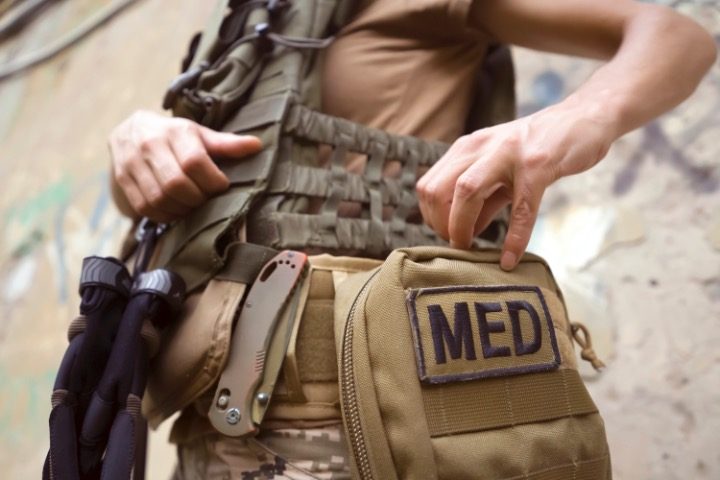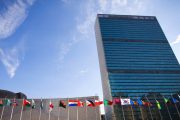
Ukraine is mandating that female medical professionals register with the military in case their services are required, with such a requirement materializing on October 1. That being said, women in a wide range of professions have had to register with the military since December 2021.
The most recent update stipulated that female doctors, nurses, midwives, dentists, and pharmacists between the ages of 18 and 60 must register with the military so that the country can take stock of the number of medical professionals available and their whereabouts.
Having said that, Ukraine’s Defense Ministry has assured that there are no upcoming plans at the moment to draft women into the army, and that women registered for the draft are not limited from leaving Ukraine as men are. Women who are pregnant or on maternity leave would not be deemed fit for military service. Moreover, women raising a child alone, as well as those with more than three minor children or who have a child with disabilities, would also be excluded from active service.
In an interview with RBC-Ukraine in September, Fedir Venislavskyi, a member of the Verkhovna Rada Committee on National Security, Defense, and Intelligence, explained the new measures.
“As for the restriction on travel abroad for conscripted women, such a restriction will apply exclusively to women who have already been mobilized,” he declared, elaborating that the men’s travel ban put in place in February 2022 does not include women who are presently in military uniform.
The first groups of women to register for possible military conscription entailed librarians, journalists, musicians, psychologists, and many other professions.
“This is not about conscription after reaching some age, as it is for men. It is about conscription in the [sic] wartime. And considering more than 122,000 Russian troops are at our borders, the decision seems logical, timely, and sensible,” said Oleksandra Ustinova, a member of Ukraine’s national parliament, the Verkhovna Rada, at the time the new law was passed.
“This sends a powerful signal to Moscow that Ukrainians are ready to resist,” Ustinova added in statements to the website Coffee or Die Magazine. “Although we strive for [the] introduction of the contract army, in [the] current situation, the decision to educate as many people as possible to hold arms and to be ready to serve seems [like] a good one.”
Based on the 2021 law, Ukrainian women between the ages of 20 and 40 can be drafted for military service as regular soldiers, and from 20 to 50 years of age for service as officers.
Since 2014, the number of women in the Ukrainian military has soared, with women serving mainly in civilian support roles such as obtaining supplies. However, a considerable number have proceeded to fight on the front lines. Usually labeled as “the invisible battalion,” women served only unofficially in Donbas, as women were not lawfully permitted in combat roles until 2018.
The year 2020 saw over 31,000 women in the Ukrainian armed forces, representing 15.6 percent of the total force. By March 2021, the number had skyrocketed to 22.5 percent of Ukraine’s military personnel. In March 2021, over 900 female officers were in command positions, including 109 platoon commanders and 12 company commanders. Additionally, 257 women have received state awards for their combat service, with nine awarded posthumously. In total, the Ukrainian military had labeled over 13,000 women as “combatants.”
On September 18, Italian Prime Minister Giorgia Meloni told a prank caller posing as an African leader that there was “a lot of fatigue” in EU circles regarding Ukraine’s crisis with Russia, disclosing that European governments were discreetly opting for a “way out” in dealing with the conflict that abided by the rules-based global order but nevertheless considered the reality in Ukraine.
Meloni also revealed that Italy was quietly preparing a peace plan to cater to both Ukraine and Russia. “Ukraine’s counteroffensive is not going as expected.… It has not changed the fate of the conflict, and everyone understands that [the conflict] could last many years if we don’t find a solution. The Ukrainians are doing what they have to do and we are trying to help them.”
The issue, she said, was “finding a way out that is acceptable for both sides without destroying international law.”
She continued, “I have some ideas on how to manage this situation, but I’m waiting for the right moment to put them on the table.”
Publicly, Meloni has always been unwavering in her support of Ukraine, a stance that was maintained by sources cited in the Italian press.
Additionally, the Italian leader admitted that the Russo-Ukrainian conflict could drag on for “many years,” voicing her reservations about Kyiv’s much-hyped counteroffensive that has been increasingly acknowledged as having not delivered in terms of military gains. Concluding, she stated that both Europe and America ought to “take care of Africa” to tackle the migrant crisis as soon as the Russo-Ukrainian crisis is dealt with.
Meloni articulated her unhappiness at the failure of European leaders to realize the gravity of Europe’s migrant crisis and political turmoil in the Sahel, stating that the problem was far more complex than what Italy alone could solve.
“Europe has thought for a long time that it could solve the problem by closing Italy. What they don’t understand is that it is impossible,” she divulged, adding that even the UN may have to help in this crisis.
The Italian leader then cautioned against French efforts to militarily intervene in Niger as she advocated for “diplomatic efforts” to solve the Sahel turmoil, claiming that Paris had ulterior economic motives to retain its clout West Africa.
Amid brewing tensions in the Sahel, Italy has repeatedly maintained its anti-colonial stance, indicating that European governments should collaborate with Africa in developing its own natural resources through efforts such as the Mattei Plan around North African gas.
Alluding to the U.K.’s botched Rwanda plan to curtail asylum fraud, Meloni proclaimed that many third-world migrants were “impossible to integrate,” doubting whether the European Commission fully understood the complexity of the issue owing to its slow response.
Meloni’s statements to the prank caller, a member of the Russian comedy duo “Vovan and Lexus,” left her embarrassed after the conversation went on for more than 13 minutes.



